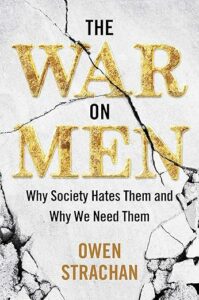Owen Strachan has released a new book, The War on Men: Why Society Hates Them and Why We Need Them (Salem Books). GBTS staff reached out to Dr. Strachan with questions about his new volume that is currently the #1 bestseller on Amazon in the category of Christian Theological Anthropology.
1. When did your thoughts start accumulating into ideas that would eventually lead to The War on Men? How did this book project originate?
I have wanted to write a book on manhood for about a decade. In 2012, I became the Executive Director of the Council on Biblical Manhood and Womanhood (CBMW). From that time on, I saw that men were struggling in modern culture. In many ways, society in our time works against men. It tells us not to be aggressive, not to be assertive, not to be courageous, not to take risks. It mocks the very idea of being “manly,” even as it applauds much that is womanly. This is not a good situation. It is especially bad because men are not doing well spiritually in this climate. Giving in to our natural sin, many men are not leading their families well, not loving their wives in a Christlike way, not investing in their children, not having fun with them, and not living life gripped by the gospel and glory of God.
It is my hope that we can reach men today. I do not want to cancel men, as so many do. I want to lift up the head of men, put an arm around their shoulder, and help them. Men need encouragement. Men need wisdom. Above all, men need Jesus. My prayer is that The War on Men meets these needs in some way.
2. How can men’s discipleship groups use this book in their churches? Also, can women’s groups read it, or is that a no-go?
It would be terrific for this book to be used in men’s discipleship. It’s a readable book and clocks in at about 180 pages. It’s accessible and friendly as a text. It can work in the home, in a small group, in a men’s ministry, and yes, even in a women’s ministry. Women, after all, are those most impacted by the struggles of men. This book will connect with men on their level, helping them see that God’s grace is real and reachable for their challenges. But it will also connect with women, because it will give them sympathy for men, help them understand men, and fire them up to train boys to be godly men.
3. Who has been the most formative influence on you as a Christian man in your life?
Alongside my Christian father, my father-in-law, Bruce Ware, has taught me a tremendous amount about being a balanced man of God. Dr. Ware is convictional and courageous, but he is also gentle and meek. He has given me a great personalized standard to emulate. Neither of us is a perfect man by a long shot, but I want to imitate Dr. Ware’s God-centeredness, his kindness, his openness to reason, and his tenacious love for the Word of God.
This is an age, by the way, when balance is not always easy to find. We’re ratcheting to extremes in 2023, whether to puffy brashness or limp passivity. Neither is good; neither is Christlike. We need to be men who can stand down evil without blinking, and men who can calm a troubled child with tenderness. Godly men are not one thing; godly men are many things. The gospel bears all kinds of fruit in our lives (see 1 Timothy 3:1–7). It makes us men controlled by the Spirit, not by our flesh.


4. Who is the best example of a common-grace-infused man, albeit one who is not a Christian, in popular culture today?
It is hard to top the example of Jordan Peterson. He has paid a steep price for principled action in the last near-decade, whether standing against the mandated usage of “preferred pronouns” or standing for free speech. Peterson needs Christ as we all do, but I sense that many young men (and women) have found in him the father figure they desire but do not have. He dresses like a man, talks like a man, and conducts himself like a man. He is not a boy or an adolescent; he is mature, hawklike in intensity, forthright in his speech, and does not flinch in the face of attack. There is real common grace in his example, much as we should pray for him.
5. If you could briefly describe what you want GBTS seminary students to aspire to as men of God, what would it be?
To be full of grace and full of truth (John 1:17). That’s what I pray men aspire to today. We don’t need fancy men. We need faithful men. We need men who humbly admit their faults and flaws, and believe in the grace of God, and live as if that grace is the realest part of their lives. We need men who know the Word, who study it doggedly, and who then act on its truth. We need men who reach out to the lost, men who go to hard places to preach the Word and gospel, and men who see themselves as the protectors of women and children.
We need men like Christ who lay down their lives for others. We need men who know that they are weak but pray to be strong (1 Kings 2:2; 1 Corinthians 16:13). Strong men are not the problem; strong men powered by God’s great grace, as I write in The War on Men, are the solution.
For more information about Grace Bible Theological Seminary, please click here.
The corporation shall not discriminate against applicants, employees, students, volunteers, and others on the basis of race, color, nationality, or ethnic origin; however, as a religious institution, the corporation reserves the right to deny or terminate employment or to deny or terminate any other status of persons whose lifestyle, words, actions or otherwise do not align with the corporation’s Statement of Faith, standard of conduct, or other policies of this organization.

